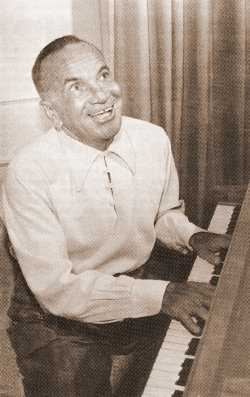| Columbia | Jolson recorded for Columbia Records from 1913 through 1923, producing some of his most memorable recordings.
1913: You Made Me Love You - Having recorded this song for Columbia, Jolson interpolated it into almost every performance, and it quickly became a favorite. The story, promulgated by Jolson himself, that it was during a performance of this song that Jolie dropped to one knee from the pain of an ingrown toenail is an interesting legend - but that's all it is!
1918: Rock-A-Bye Your Baby With A Dixie Melody - Introduced in the show Sinbad, this song became one of the most recorded Jolson songs, even being included in his first sound movie. Rarely heard, but beautifully rendered, here is the original acoustic recording of this song, listen for the "baby kisses" in the chorus! A smash hit, it stayed on the Billboard charts for fourteen weeks, and was number one for eight of them!
1920: Swanee - George Gershwin's first hit song, with lyrics by Irving Caesar, was written in 1919, and heard by Jolson in December of that year. It was put to disc by Jolson in 1920, being introduced in Sinbad. Contrary to the story shown in Rhapsody In Blue, it was Buddy DeSylva who brought Gershwin to a party Jolson was throwing that allowed Jolson to hear Gershwin's song.
1920: Avalon - This classic Jolson number is credited to Al Jolson and Vincent Rose. Trouble was that if you listen to Puccini's opera Tosca, you will hear an aria that sounds suspiciously familiar. So familiar, in fact, that when Puccini sued, it cost Jolson and Rose $25,000 each. But it was a good investment, as Jolson collected double, for writing and perfoming this song, for the rest of his career.
1921: April Showers - If Al Jolson had a theme song, this was it. Introduced in the show Bombo, "April Showers" was a hit from the start, a favorite of soldiers overseas, and the theme song for Jolson's radio shows.
1922: Toot, Toot, Tootsie - Fated to be the big hit in The Jazz Singer, here is the original recording of this Jolson classic.
Other than these recordings, a listing of the Complete Columbia Discography remains online for your reference. Just click and have a look! |
| Brunswick | Jolson recorded for Brunswick Records for only nine years, from 1924 through 1932, but in that time produced many of his classic numbers. Here are some favorites. Please feel free to check out the Complete Brunswick Discography and nominate your favorites for inclusion in this section!
1924: California, Here I Come -
Al Jolson opened Bombo in 1923, without a new hit song. With a west coast tour pending, Buddy DeSilva thought a song about California might work, and Al agreed. He introduced it at a matinee, and it flopped. Persuaded to try a reorchestrated arrangement by conductor Al Goodman, it became one of Jolson's greatest hits. That's DeSylva, himself, on the ukulele!
1925: I'm Sitting On Top Of The World - This was the first Jolson recording done "electrically" rather than with the old acoustic horn. Starting with this song, we begin to hear the nuances of the early Jolson voice.
1926: When The Red, Red, Robin Comes Bob, Bob, Bobbin' Along - Harry Woods wrote this Jolson number which it's hard to imagine anyone else doing justice to.
1928: Back In Your Own Backyard - First recorded in the movie Say It With Songs, this sentimental favorite about home became a favorite of troops overseas.
1928: My Mammy - To many people, the song that defines Al Jolson, used as the closer for The Jazz Singer, this song was said to have been introduced by William Frawley, and given to Jolson in 1921. Or did Jolson take it from him?
1928: There's A Rainbow 'Round My Shoulder - Can you believe that the same movie that gave us "Sonny Boy" gave us this cheery number? One of a number of songs that features Jolson's whistling, here he whistles a whole chorus, not just a bridge.
1928: Sonny Boy - The story of how Buddy DeSylva, Lew Brown and Ray Henderson responded to Jolson's request for a song for The Singing Fool, describing the tear jerker of a dying Sonny Boy is legend. Maybe it really happened that way; this recording of the song became a phenomenal success!
1929: Liza (All The Clouds'll Roll Away) - Did Al Jolson really stand up in the theatre of Ziegfeld's Show Girl as Ruby Keeler danced and sing this song? I've read about it in many versions; but it's a great story, and Jolie liked to tell it, himself. Whatever, it's a great Gershwin classic.
1930: Let Me Sing And I'm Happy - The song that for many defines Al Jolson was written by Irving Berlin for the movie Mammy in 1930. Here is the Brunswick version from 1930.
1932: The Cantor (A Chazend'l Ofn Shabbos) - Al Jolson sang this Yiddish number in the show The Wonder Bar. It was not included in the movie derived from the show, and, although recorded for The Jolson Story was cut from that production. Here is the original recording for your enjoyment.
|
| Decca | During the last five years of his life, Al Jolson recorded for the Decca label, producing recordings that, for many, are the best ones he ever did. With his post-war mellow baritone, Al Jolson recorded all of his standards, some of which had never been officially recorded before, as well as tunes of the day, novelty numbers, religious songs, and, years before Frank thought of it, duets. Here are some selections from the Decca recordings. Look over the full Decca Discography, and nominate your favorites for inclusion on this site in the future. I hope you enjoy them all!
1946: Ma Blushin' Rosie - Al Jolson often told the tale of this being the first song he sang in public, having heard the legendary Faye Templeton sing it in a saloon. Whether it's true or not, it made a great story; Jolie did not record the song until its appearance in The Jolson Story. Here is the commercial release of this classic number.
1946: Anniversary Song - During the filming of The Jolson Story, legend has it that Al was often heard humming a little tune while listening for a playback. Called on it, he recalled the tune, Jan Ivanovici's "Waves of the Danube", as a tune his mother used to hum to him while rocking him to sleep. Deciding to incorporate it into the picture, Jolson wrote the first line, and the lyric was completed by lyricist Saul Chaplin. The tune became the hit new number of the picture.
1947: Alexander's Ragtime Band - Performed in duet with Bing Crosby, this is a delight of a recording which shows the friendship between these two great stars.
1947: Carolina In The Morning - My favorite story about this song is from the 1951 movie, I'll See You In My Dreams, starring Danny Thomas as Gus Kahn. When challenged as to what kind of lyrics "in the mo-o-orn-ing" were, he replied, "It fits the no-o-o-otes!" "Give it to Jolson," was the rejoinder, and so it was.
1947: About A Quarter To Nine - From Go Into Your Dance, the movie he made with his wife, Ruby Keeler, here is the wonderful Decca recording of one of the hit songs of the movie.
1947: Waiting For The Robert E. Lee - Another song closely identified with Jolson, it was also not recorded until the Decca series surfaced in the late 1940s. He did perform it on several radio shows, with different arrangements, but this is the one that we all remember.
1947: Golden Gate - Heard in the movie The Singing Fool, this tribute to the San Francisco Bay never sounded so good as in this 1947 recording.
1947: When You Were Sweet Sixteen - For many of us, this song was the first we heard of the Jolson voice, as Larry Parks discovers his new tones singing as he woke up.
1947: If I Only Had A Match - Jolie introduced this song on the Kraft Music Hall, singing it twice on the same program. That's how much he loved it!
1947: When The Red, Red Robin Comes Bob, Bob Bobbin' Along - Another rerecording of a Jolson classic. Jolie waxed this upbeat version of a song he recorded in 1926!
1949: After You've Gone - Accompanied by Four Hits and a Miss, this bouncy number was another overseas favorite.
1949: Is It True What They Say About Dixie? - This wonderful song is often heard in duet with the Mills Brothers, but here is a version Jolie recorded for Decca with just himself, and included the rarely heard verse.
1950: Are You Lonesome Tonight? - To many people, the only recording of this song that they are familiar with is the one done by Elvis Presley. As we remember this king of rock and roll, who died on August 16, 1977, let us not forget that he idolized our own Al Jolson, who died almost 27 years before, on October 23, 1950. Just listening to Jolson's recording of this classic number illustrates this dramatically!
|
|
Radio
& Film | Although most of the songs we know and love from Al Jolson were set down on commercial recordings, several were never so issued. Here we see some other classic and distinctive Jolson tunes, which were performed on the radio or in motion pictures, and never released as commercial recordings. It is fortunate that we have this legacy to remember the essence of The World's Greatest Entertainer, Al Jolson.
1939: Brother Can You Spare A Dime? - There have been many recordings of this song, which epitomized the country's mood during the Great Depression. Jolie's only recording of the number, from an NBC broadcast "The Need To Preserve The Federal Theater," on June 26, 1939, has just got to be the best.
1947: I'll Be Seeing You - This number was a favorite of World War II audiences, for good reason. Hear how Jolie could put it over during a Kraft Music Hall broadcast, one of several times that he sang this song.
1949: Without A Song - Al Jolson changed one of the lyrics of this song when he sang it in 1949, from previous recordings, indicating a sensitivity to changing times. But Al gave this song soul as only he could, in this recording from a Kraft Music Hall broadcast.
1949: I'm Always Chasing Rainbows - Lifting a tune from Chopin's "Fantasy Impromptu," Carroll and McCarthy created one of Jolson's most endearing hits. Compare this recording, from a Kraft Music Hall broadcast, with other artists' interpretations, and I think you'll see why Jolie owned this song.
1949: Baby Face - In 1949, the legend goes, Al Jolson made a "screen test" film either to show how he could play himself or to show Larry Parks how to mimic his movements. This recording of "Baby Face" is from that film. Just one year before his death, with one lung, Jolie's voice was still as energetic as in his youth.
| |


